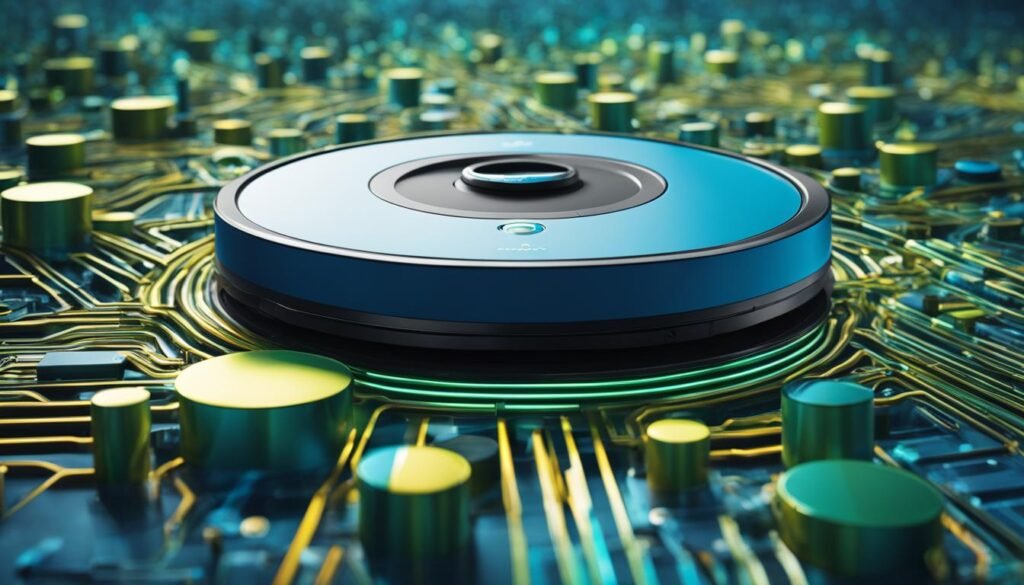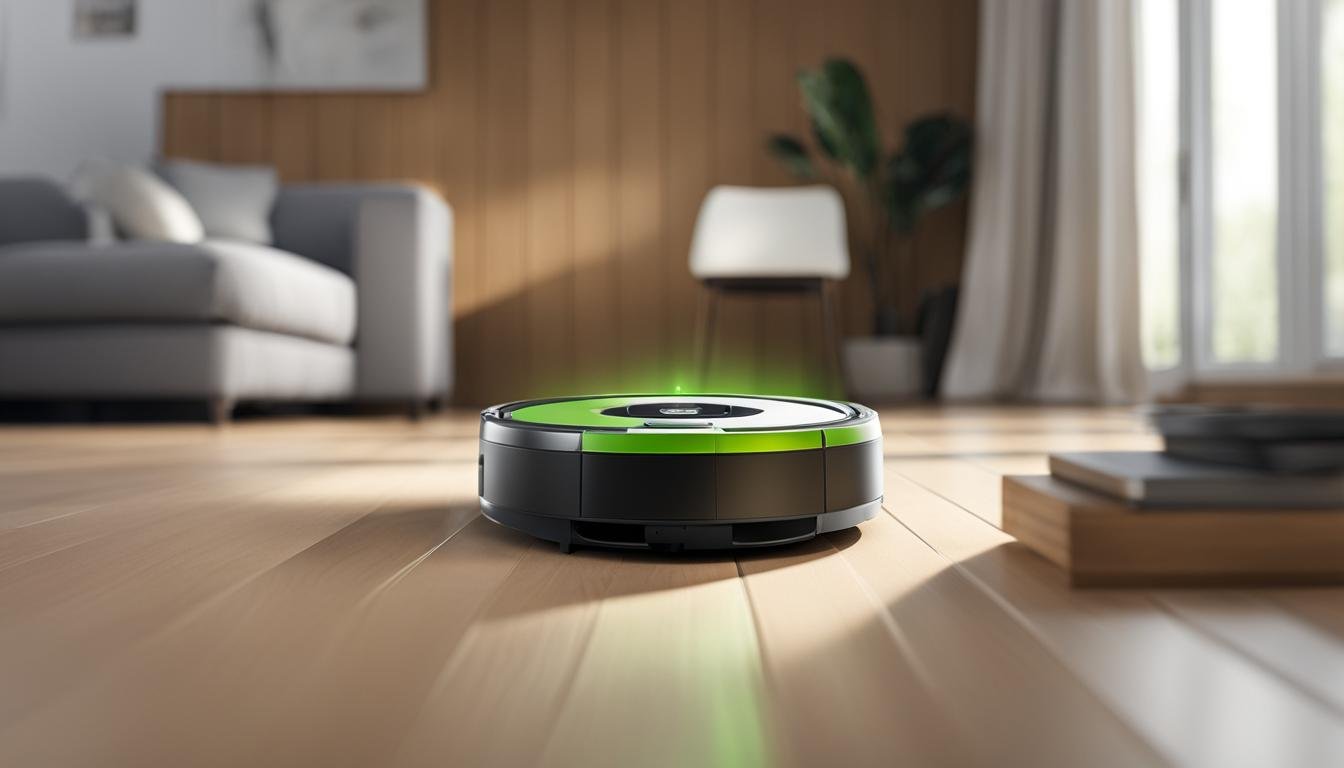Have you ever wondered how long a Roomba battery lasts? As a proud owner of a Roomba, I was also curious about the battery life and how I could optimize it. After some research and personal experience, I’ve gathered valuable insights that I’m excited to share with you.
Firstly, let’s talk about the battery itself. The Roomba is equipped with a nickel-based battery consisting of 12 NiMH batteries. According to iRobot, the battery can run for up to 2 hours, providing an efficient cleaning experience. Furthermore, it can last for approximately 400 charges before needing a replacement.
However, it’s important to note that the lifespan of the battery can be influenced by various factors. By taking proper care of your Roomba and following a few key practices, you can optimize its battery life and ensure it lasts for a long time. Let’s dive into some actionable tips.
Key Takeaways:
- Roomba batteries are nickel-based and consist of 12 NiMH batteries.
- The battery can run for up to 2 hours and last for approximately 400 charges.
- To optimize Roomba battery life, clean the brushes regularly and keep the unit charged and in frequent use.
- Occasionally exhaust the battery and store the Roomba in a cool and dry place.
- Putting the Roomba in vacation mode when not in use for an extended period can help maintain the battery’s health.
Factors Affecting Roomba Battery Life
Understanding the factors that influence Roomba battery life is crucial for optimizing its performance and maximizing its longevity. Several key elements can impact the lifespan and efficiency of the Roomba’s battery, including:
- The type of battery:
The type of battery used in the Roomba plays a significant role in its overall performance and durability. Lithium-ion batteries are known for their superior performance and longer lifespan compared to nickel-metal hydride batteries. While nickel batteries typically last about 400 charge cycles, equivalent to approximately 2 years of use, the lithium batteries can endure approximately 1,500-2,000 cycles, extending its lifespan to around 5 years.
- The condition of the brushes and filters:
The brushes and filters of the Roomba are integral components that directly impact the battery’s performance and efficiency. It is vital to regularly clean and maintain these parts to maximize battery life. Ideally, the brushes should be replaced every 6-12 months to ensure optimal functioning, while the filters should be cleaned or replaced every two months.

“Regular maintenance of the brushes and filters is essential to keep the Roomba battery performing at its best.”
By frequently checking and cleaning the brushes and filters, you can prevent any blockages or build-up that may strain the Roomba’s battery and compromise its performance.
Quick Tip:
If you notice that the Roomba is not operating at its usual efficiency, one possible cause could be the condition of the brushes and filters. By following the recommended maintenance schedule and keeping these components clean, you can ensure optimal battery performance and extend its overall lifespan.
| Factors | Impacts |
|---|---|
| Type of battery | Determines lifespan and overall performance. |
| Condition of brushes and filters | Affects battery efficiency and performance. |
Troubleshooting Roomba Battery Issues
Roomba batteries are prone to certain common problems that can affect battery performance and health. Some of these issues include erratic charging, the power light not illuminating, and the Roomba shutting down prematurely during cleaning cycles. If you encounter any of these problems, here are some troubleshooting steps you can take to address them and improve the battery’s runtime and overall health:
- Allow the battery to cool down: If the Roomba battery overheats during operation, it can affect its performance. Allow the battery to cool down before attempting to use the Roomba again.
- Ensure proper installation: Make sure the battery is properly installed in the Roomba. Check for any loose connections and ensure it is securely seated in the battery compartment.
- Clean the charging contacts: Over time, dirt and debris can accumulate on the charging contacts, leading to poor charging efficiency. Clean the contacts with a dry cloth or cotton swab to ensure optimal charging performance.
- Reset the battery: To reset the Roomba battery, hold down the power button for 10-15 seconds until the Roomba powers off. Release the power button and then press it again to turn the Roomba back on.
- Charge from the power supply: Instead of charging the Roomba from the home base, try charging it directly from the power supply. This can help ensure a more efficient and effective charging process.
- Extended charging time: After the power light turns on, keep the Roomba on the charger for an additional 72 hours to ensure it is fully charged. This can help optimize battery performance and runtime.
By following these troubleshooting steps, you can address common Roomba battery issues and improve the battery’s runtime and overall health. Proper maintenance and care are essential for extending the lifespan of your Roomba battery and ensuring optimal performance.
Conclusion
In conclusion, maximizing the lifespan and durability of your Roomba battery is crucial for maintaining optimal performance. By following these simple tips, you can enhance the longevity of your battery and ensure that your Roomba remains a reliable cleaning companion for years to come.
Firstly, regularly cleaning the brushes and filters is essential. These components can accumulate dirt, hair, and debris over time, which can negatively impact the battery’s performance. By cleaning them regularly, you can prevent clogs and maintain efficient operation.
Secondly, keeping your Roomba charged and in use regularly is key. Letting the battery sit unused for extended periods can lead to capacity loss and decreased performance. By using your Roomba frequently, you allow the battery to go through full discharge and recharge cycles, which helps maintain its health and longevity.
Lastly, storing your Roomba in a cool and dry place is important. Extreme temperatures and humidity can have a detrimental effect on the battery’s lifespan. Therefore, it’s best to store your Roomba in a location that is away from direct sunlight, excessive heat, and moisture.
FAQ
How long does the Roomba battery last?
The Roomba battery can run for up to 2 hours and lasts about 400 charges.
What factors affect Roomba battery life?
Roomba battery life can be influenced by factors such as battery type, charge cycles, and the condition of brushes and filters.
How can I troubleshoot Roomba battery issues?
Troubleshooting steps for Roomba battery issues include allowing the battery to cool down, cleaning charging contacts, and ensuring proper installation.
What are some tips for maintaining Roomba battery health?
To maintain Roomba battery health, clean the brushes and filters regularly, keep the Roomba charged and in use, and periodically exhaust the battery.





Leave a Reply